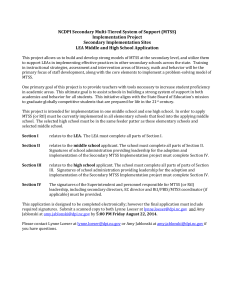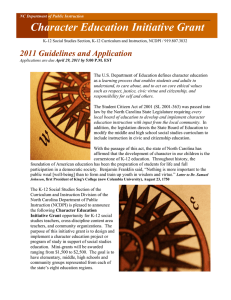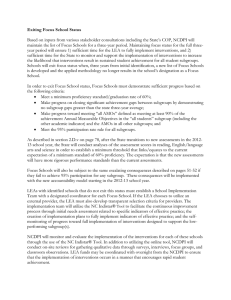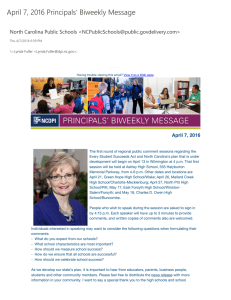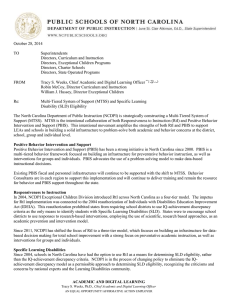August 11, 2015 TO Superintendents
advertisement
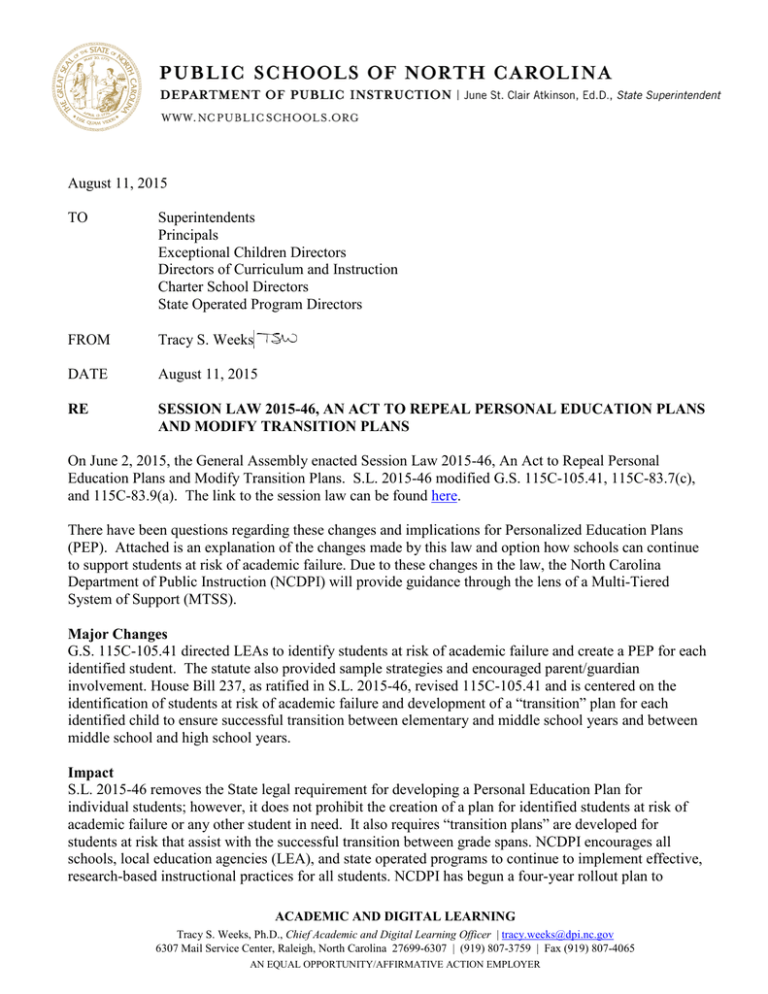
August 11, 2015 TO Superintendents Principals Exceptional Children Directors Directors of Curriculum and Instruction Charter School Directors State Operated Program Directors FROM Tracy S. Weeks DATE August 11, 2015 RE SESSION LAW 2015-46, AN ACT TO REPEAL PERSONAL EDUCATION PLANS AND MODIFY TRANSITION PLANS On June 2, 2015, the General Assembly enacted Session Law 2015-46, An Act to Repeal Personal Education Plans and Modify Transition Plans. S.L. 2015-46 modified G.S. 115C-105.41, 115C-83.7(c), and 115C-83.9(a). The link to the session law can be found here. There have been questions regarding these changes and implications for Personalized Education Plans (PEP). Attached is an explanation of the changes made by this law and option how schools can continue to support students at risk of academic failure. Due to these changes in the law, the North Carolina Department of Public Instruction (NCDPI) will provide guidance through the lens of a Multi-Tiered System of Support (MTSS). Major Changes G.S. 115C-105.41 directed LEAs to identify students at risk of academic failure and create a PEP for each identified student. The statute also provided sample strategies and encouraged parent/guardian involvement. House Bill 237, as ratified in S.L. 2015-46, revised 115C-105.41 and is centered on the identification of students at risk of academic failure and development of a “transition” plan for each identified child to ensure successful transition between elementary and middle school years and between middle school and high school years. Impact S.L. 2015-46 removes the State legal requirement for developing a Personal Education Plan for individual students; however, it does not prohibit the creation of a plan for identified students at risk of academic failure or any other student in need. It also requires “transition plans” are developed for students at risk that assist with the successful transition between grade spans. NCDPI encourages all schools, local education agencies (LEA), and state operated programs to continue to implement effective, research-based instructional practices for all students. NCDPI has begun a four-year rollout plan to ACADEMIC AND DIGITAL LEARNING Tracy S. Weeks, Ph.D., Chief Academic and Digital Learning Officer | tracy.weeks@dpi.nc.gov 6307 Mail Service Center, Raleigh, North Carolina 27699-6307 | (919) 807-3759 | Fax (919) 807-4065 AN EQUAL OPPORTUNITY/AFFIRMATIVE ACTION EMPLOYER support statewide implementation of a Multi-Tiered System of Support (MTSS) to assist with implementation of these practices. Guidance The law requires the identification of students at risk of academic failure. Best practice supports the need for a method to document the academic profile of students receiving interventions in a more granular level than a cumulative record provides. Capturing a student’s response to research-based interventions is an essential component to problem-solving identified student concerns. Each school, LEA, and state operated program should determine the extent and format of this documentation. Best practice also stresses that parents/guardians should be an intricate part of the problem-solving process when student concerns are identified. Guidance on parent involvement should be developed at the local level. Any school, LEA, and state operated program making changes to current practices should plan for shortand long-term implications. This should include determining the impact of federal and state policies on decision making. The Division of Integrated Academic and Behavior Systems will provide continued assistance regarding this change with leadership from Amy Jablonski. LEA and school leaders are encouraged to read the changes and develop a communication plan for stakeholders. Visit the NCDPI MTSS wikispace for the most up to date information http://mtss.ncdpi.wikispaces.net/ regarding creating a successful system of support for all students. For questions about this transition, contact Amy Jablonski at amy.jablonski@dpi.nc.gov or (919) 807-3857. TSW/aj c: June St. Clair Atkinson, State Superintendent Rebecca Garland, Deputy State Superintendent Adam Levinson, Interim Director, Office of Charter Schools Bill Hussey, Director, Division of Exceptional Children Tiffany Perkins, Director, Division of K-12 Curriculum and Instruction This table unpacks the details of S.L. 2015-46. Area Section Title 115C-105.41 Students who have been placed at risk of academic failure; personal education plans; transition teams; and transition plans Session Law 2015-46 Students who have been placed at risk of academic failure and transition plans Timeline for identifying students at risk of academic failure Beginning in Kindergarten Beginning in Kindergarten As early as reasonably possible in each grade level As early as reasonably possible in each grade level Complete Personal Education Plan (PEP) No later than the end of the first quarter, or nine weeks of instructional time Repealed Transition Local boards of education adopt and implement plans for the creation of transition teams and transition plans for at risk students to assist them in making a successful transitions between the elementary and middle school years and between the middle school and high school years Local boards of education adopt policies that direct school improvement teams to develop transition plans to support successful transition between elementary and middle school years and between the middle school and high school years for students at risk For questions about this transition, contact Amy Jablonski at amy.jablonski@dpi.nc.gov or (919) 807-3857.
